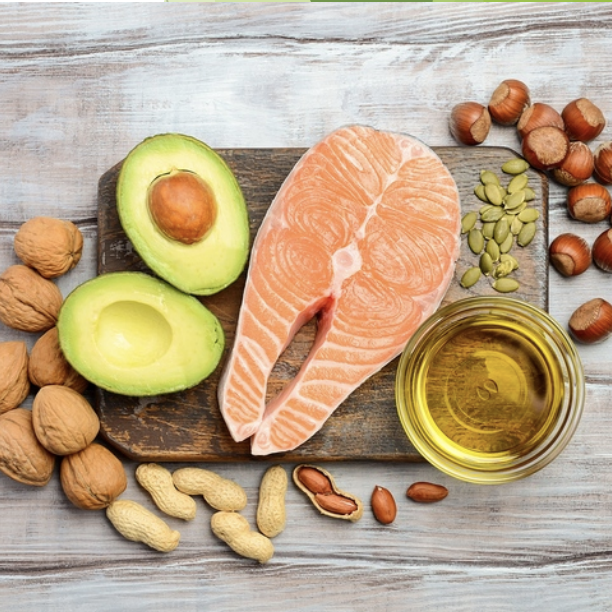 Good nutrition is important for maintenance of mental and physical health. But, nutrition is particularly important when recovering from physical trauma, such as concussion. When an injury, like a concussion, occurs the brain requires extra energy in the form of nutrition to heal the injury.
Good nutrition is important for maintenance of mental and physical health. But, nutrition is particularly important when recovering from physical trauma, such as concussion. When an injury, like a concussion, occurs the brain requires extra energy in the form of nutrition to heal the injury.
For a helpful introduction about nutrition to support the recovery process after concussion, Schurig Center invites you to view a guide from the ThinkSmart! Concussion Management Program of St. Charles Hospital in New York called “Nutritional Role in Concussion Management & Recovery.”
For additional concussion education, check out… ConcussionSmart Marin
Helping to Keep Marin’s Students & Youth Athletes Safe
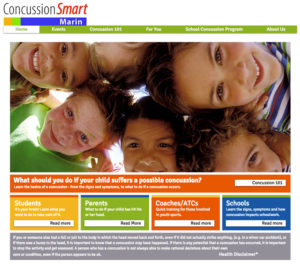 In response to the growing concern over the effects of youth concussions, Schurig Center has partnered with other community organizations to form ConcussionSmart Marin – a coalition to design and implement uniform county-wide protocols for educating, reporting and treating concussions among Marin’s students and youth athletes.
In response to the growing concern over the effects of youth concussions, Schurig Center has partnered with other community organizations to form ConcussionSmart Marin – a coalition to design and implement uniform county-wide protocols for educating, reporting and treating concussions among Marin’s students and youth athletes.
ConcussionSmart Marin’s website, ConcussionSmartMarin.org, is a user-friendly information portal providing education about concussions, treatment options, videos, and online training courses for coaches.
The goal of the site is to improve identification of concussions and assist students, parents, teachers, coaches and medical professionals in the evaluation and management process. Coaches can access online training courses established in new California concussion laws, AB25 and AB1451. In addition, parents can obtain information and a list of valuable questions they can ask their doctor if a child is suspected or has sustained a concussion.
In addition to Schurig Center, ConcussionSmart Marin’s members include:
Kaiser Permanente, The Marin Athletic Foundation, Marin County Office of Education, Marin County School Nurses, Marin County Health and Human Services, Marin General Hospital, Novato Community Hospital, and Certified Athletic Trainers.

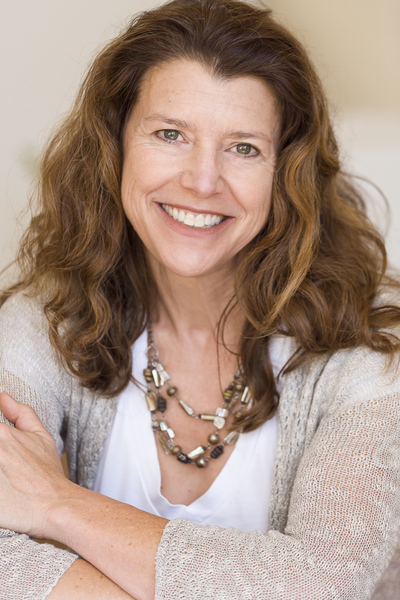 Dear Friends,
Dear Friends, 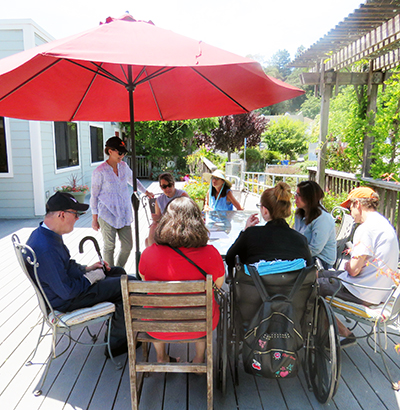 Schurig Center is a place where survivors and their families and caregivers can learn how to understand their new challenges, connect with people who know what they are experiencing and access ongoing services and education to help make life better. It fills a big gap in our healthcare system that otherwise would leave people on their own to research and find therapies for their recovery.
Schurig Center is a place where survivors and their families and caregivers can learn how to understand their new challenges, connect with people who know what they are experiencing and access ongoing services and education to help make life better. It fills a big gap in our healthcare system that otherwise would leave people on their own to research and find therapies for their recovery. Summer is almost here! School will be out soon and people everywhere will be enjoying vacations and outdoor recreation. Summer is also known as “trauma season” in the healthcare world due to the number of injuries that can happen during summertime activities. While this is true, there are easy things we can do to help reduce the risk of brain injury.
Summer is almost here! School will be out soon and people everywhere will be enjoying vacations and outdoor recreation. Summer is also known as “trauma season” in the healthcare world due to the number of injuries that can happen during summertime activities. While this is true, there are easy things we can do to help reduce the risk of brain injury.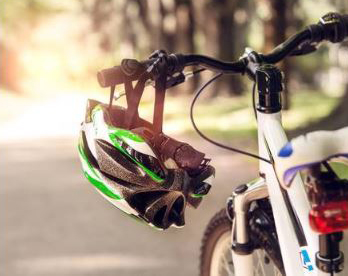 Wear a properly fitted helmet when bicycling or engaging in any recreational activity that may result in a head injury. Although there is no “concussion-proof” helmet, a helmet is a must to help reduce the risk of a serious brain injury. After an accident, replace your helmet because it may not be as protective as it was prior to the accident. Visit the CDC’s web site for more helmet safety tips
Wear a properly fitted helmet when bicycling or engaging in any recreational activity that may result in a head injury. Although there is no “concussion-proof” helmet, a helmet is a must to help reduce the risk of a serious brain injury. After an accident, replace your helmet because it may not be as protective as it was prior to the accident. Visit the CDC’s web site for more helmet safety tips 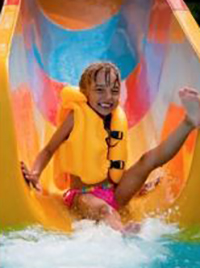 Whether in a pool or the ocean, wearing the appropriate water safety gear, like a life jacket, is critical to preventing injury. Make sure safety gear is well-fitted, worn correctly, and well-maintained. Always supervise children when in or around water. To reduce fall risk, discourage running near or around pools where the ground might be slippery with water. Teach kids to swim. Formal lessons can protect young children from drowning. Learn cardiopulmonary resuscitation (CPR). Your skills could save someone’s life! Get more “H2O Smart” Tips on the CDC’s web site
Whether in a pool or the ocean, wearing the appropriate water safety gear, like a life jacket, is critical to preventing injury. Make sure safety gear is well-fitted, worn correctly, and well-maintained. Always supervise children when in or around water. To reduce fall risk, discourage running near or around pools where the ground might be slippery with water. Teach kids to swim. Formal lessons can protect young children from drowning. Learn cardiopulmonary resuscitation (CPR). Your skills could save someone’s life! Get more “H2O Smart” Tips on the CDC’s web site  Falls are a leading cause of concussion for both the young and the elderly. To reduce the risk of falls, ensure your home is well-lit and free of tripping hazards, such as electrical cords across walkways, loose rugs, or scattered toys. Consider blocking off stairways with safety gates and installing window guards. Check that outside play equipment is appropriate to the age of the children using it and that it has guardrails to prevent falls as well a soft material underneath, such as mulch or sand.
Falls are a leading cause of concussion for both the young and the elderly. To reduce the risk of falls, ensure your home is well-lit and free of tripping hazards, such as electrical cords across walkways, loose rugs, or scattered toys. Consider blocking off stairways with safety gates and installing window guards. Check that outside play equipment is appropriate to the age of the children using it and that it has guardrails to prevent falls as well a soft material underneath, such as mulch or sand.  When you head out on your summer road trip, buckle up with a seatbelt and use age- and size-appropriate car seats that are properly installed for child passengers. The research is clear – belted passengers sustain fewer and less severe traumatic brain injuries compared to those who are unbelted. Find more child passenger safety
When you head out on your summer road trip, buckle up with a seatbelt and use age- and size-appropriate car seats that are properly installed for child passengers. The research is clear – belted passengers sustain fewer and less severe traumatic brain injuries compared to those who are unbelted. Find more child passenger safety  When doing outdoor activities, like hiking, or engaging in any high risk sports or motor activities, make sure you are aware of the terrain you are about to encounter as well as your ability to navigate the terrain. Know the depth of water prior to diving into a pool or natural body of water. Always ensure a loved one knows exactly where you are and how to find you. Concussion can occur quickly and cause disorientation that can make it difficult to let others know you are in need of help.
When doing outdoor activities, like hiking, or engaging in any high risk sports or motor activities, make sure you are aware of the terrain you are about to encounter as well as your ability to navigate the terrain. Know the depth of water prior to diving into a pool or natural body of water. Always ensure a loved one knows exactly where you are and how to find you. Concussion can occur quickly and cause disorientation that can make it difficult to let others know you are in need of help.  A concussion is a type of traumatic brain injury (TBI) caused by a bump, blow, or jolt to the head or by a hit to the body that causes the head and brain to move rapidly back and forth. Signs and symptoms generally show up soon after the injury. However, unlike a broken leg, the signs of a concussion are often ‘invisible,’ such as a headache, disorientation, nausea, incoordination, and memory deficits.
A concussion is a type of traumatic brain injury (TBI) caused by a bump, blow, or jolt to the head or by a hit to the body that causes the head and brain to move rapidly back and forth. Signs and symptoms generally show up soon after the injury. However, unlike a broken leg, the signs of a concussion are often ‘invisible,’ such as a headache, disorientation, nausea, incoordination, and memory deficits.